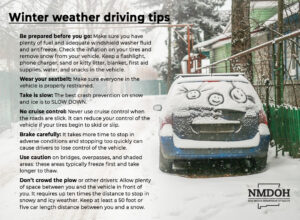 Be prepared before you go: Make sure you have plenty of fuel and adequate windshield washer fluid and antifreeze. Check the inflation on your tires and remove snow from your vehicle. Keep a flashlight, phone charger, sand or kitty litter, blanket, first aid supplies, water, and snacks in the vehicle.
Be prepared before you go: Make sure you have plenty of fuel and adequate windshield washer fluid and antifreeze. Check the inflation on your tires and remove snow from your vehicle. Keep a flashlight, phone charger, sand or kitty litter, blanket, first aid supplies, water, and snacks in the vehicle.
Wear your seatbelt: Make sure everyone in the vehicle is properly restrained.
Take is slow: The best crash prevention on snow and ice is to SLOW DOWN.
No cruise control: Never use cruise control when the roads are slick. It can reduce your control of the vehicle if your tires begin to skid or slip.
Brake carefully: It takes more time to stop in adverse conditions and stopping too quickly can cause drivers to lose control of the vehicle.
Use caution on bridges, overpasses, and shaded areas: these areas typically freeze first and take longer to thaw.
Don’t crowd the plow or other drivers: Allow plenty of space between you and the vehicle in front of you. It requires up ten times the distance to stop in snowy and icy weather. Keep at least a 50 foot or five car length distance between you and a snow.
From the New Mexico Department of Health (NHDOH)
Leave a Reply